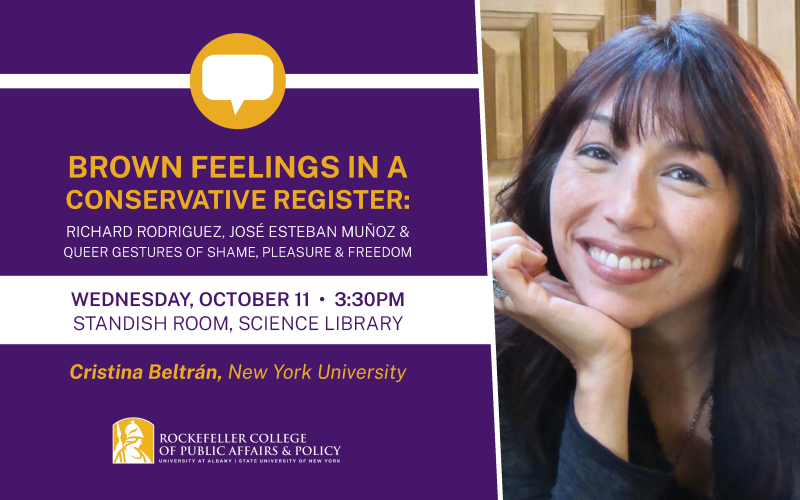Brown Feelings in a Conservative Register

Brown Feelings in a Conservative Register:
Richard Rodriguez, José Esteban Muñoz and Queer Gestures of Shame, Pleasure, and Freedom
Cristina Beltrán, New York University
Wednesday, October 11, 2023 • 3:30-5pm
Standish Room • Science Library • UAlbany Uptown Campus
The Rockefeller College Department of Political Science will be hosting Cristina Beltrán from New York University on Wednesday, October 11th. Beltrán is an Associate Professor in the Department of Social & Cultural Analysis at NYU. A political theorist by training, her research focuses on modern and contemporary political theory, Latino and U.S. ethnic/racial politics, and feminist and queer theory. She is author of The Trouble with Unity: Latino Politics and the Creation of Identity (Oxford University Press, 2010) and Cruelty as Citizenship: How Migrant Suffering Sustains White Democracy (University of Minnesota Press, 2020). Along with Libby Anker, she is also co-editor of the journal Theory & Event.
Cristina Beltrán's essay analyzes Latino conservative thought by rethinking the logics of assimilation through a simultaneous exploration of aesthetic possibility and negative affect. Focusing on the writings of Richard Rodriguez and José Esteban Muñoz, the essay considers how creative forms of self-individuation and political agency cannot easily be decoupled from negative forms of identification and disidentification. Drawing on Muñoz's analysis of "feeling brown," the essay explores the interplay Rodriguez stages between shame, stigma, appropriation, pleasure, and play. Turning to queer theory and theories of affect as a way to more fully understand the latent intensities and political logics that operate in Rodriguez’s queer-yet-conservative depictions of assimilation, the essay attends to the many ways that “the deployment of sexuality intersects with the deployment of race.” This reading of racialized sexuality works to resist a priori assumptions that such forms of intersectionality are necessarily reparative or politically radical. Rodriguez simultaneously articulates a queer form of racialized sexuality that resists normalization while also sustaining a conservative logic that approaches identity-based movements as spaces of disciplinary power, devoid of creativity and play.
Light reception to follow.


